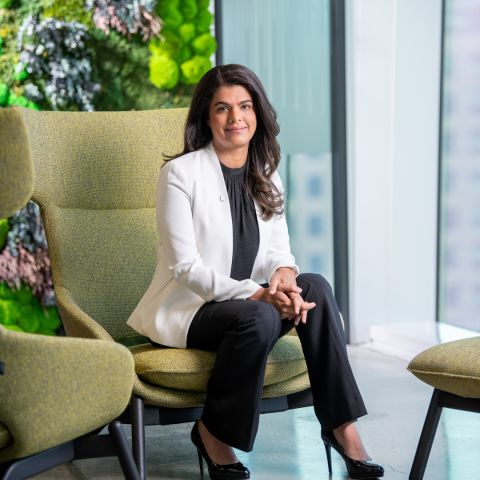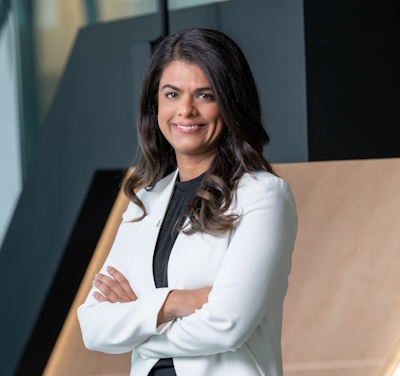
Bindu Dhaliwal, Law’02, the first ESG legal counsel at a Canadian bank, helped create a job based on her passion for emerging social and environmental issues
Throughout law school, Bindu Dhaliwal, Law’02, always envisioned herself becoming a litigator. Volunteering at Queen’s Law Clinics, mooting, “and lots of litigation-based activities” helped prepare her for her first job with a national firm, followed by clerking at the Ontario Court of Appeal. Dhaliwal then transitioned to a different area of law, working as an in-house lawyer for BMO.
But all the while, an inner voice kept prodding her.
“Rather than the traditional legal matters I was handling in my day job,” she recalls, “I came to realize that my true passion lay with equity and sustainability issues.” Inspired by a U of T graduate course in sustainability, completed while she was on maternity leave, Dhaliwal gave notice at the bank, citing her plans to look for policy work in the non-profit sector. Serendipity stepped in when her bosses asked if she would consider a different option.
“It turned out they had been contemplating a new legal role in sustainability, but hadn’t fleshed it out yet,” she says. “Since there was no comparable position at a bank in Canada then, I ended up writing my own job description.”
So it was that in 2012 she became the first person to take on an ESG/legal counsel role in a Canadian bank, dealing with reputational risk, disclosure, and related issues.
“I knew I wanted to do something different but was really glad to be able to keep a legal component in my job,” Dhaliwal continues. “Had I not told them of my plans to shift focus, I wouldn’t have known the bank wanted to go that direction, too.”
At the time, ESG (environmental, social, and governance) was a new framework being embraced by a handful of forward-looking corporations and institutions to assess sustainability-related risks and opportunities in their operations. In the decade since, it has evolved from a voluntary set of criteria to a framework that is increasingly becoming more formalized to allow stakeholders, like investors and regulators, to evaluate a company’s activities – and Dhaliwal’s career has followed a parallel path.
After leading BMO’s ESG team for a number of years, Dhaliwal became the Ombudsperson (Client Complaints and Whistleblower). In April 2020, she joined CIBC as Vice-President, ESG, responsible for ESG strategy, disclosure, governance, and stakeholder engagement activities. Two years later, a promotion to Senior Vice-President, ESG & Corporate Governance, expanded her responsibilities to include CIBC’s Corporate Secretary function, Whistleblower Program, and Client Complaints Appeals Office. “I think my prior experience in various components of the new role came together to bring me this leadership opportunity,” says Dhaliwal.
The CIBC team has developed medium- and long-term strategic goals with associated performance indicators to measure their progress in each ESG focus area – for example, the bank’s $300-billion sustainable finance mobilization goal and net-zero interim targets announced in 2021. They have also enhanced CIBC’s ESG governance framework to drive accountability at the board, senior management, and day-to-day execution support levels. Noting that ESG is a top priority for CIBC’s stakeholders, she adds: “People are looking to us and challenging us as an institution to play a role in addressing these evolving issues.”
In April, the Queen’s Law alumna was appointed to the new Canadian Sustainability Standards Board (CSSB), formed to support the uptake of International Sustainability Standards Board (ISSB) standards in Canada and ensure Canadian sustainability reporting needs are heard on the international stage. Unveiled at the 2021 COP26 summit in Glasgow, the ISSB was created to develop a global baseline of sustainability disclosures to meet the needs of investors and financial markets overall. The first of such standards, published in June 2023, focused on both climate-related and general sustainability-related disclosures.
Chaired by Charles-Antoine St-Jean, former president of the Chartered Professional Accountants of Canada, the CSSB will work in lockstep with its international counterpart – highlighting key issues for the Canadian context and facilitating interoperability between ISSB standards and any forthcoming CSSB standards. Dhaliwal welcomes this move toward formalizing the disclosure of ESG metrics and sees it as an important step in ensuring stakeholders are properly able to assess a company’s ESG risks and opportunities.
A second emerging ESG issue is the urgency of climate action and getting related goals set. “It’s about having specific goals that can be measured and disclosed,” Dhaliwal explains. “At CIBC, our net-zero target-setting framework is guided by four principles: science-aligned, comprehensive, transparent, and iterative. Our sector-specific 2030 interim financed emissions-reduction targets are informed by climate science and aligned with widely accepted decarbonization pathways.”
The third important trend is what she calls “the rise of the ‘S’” (social impact) in ESG. “Issues like affordable housing and Indigenous rights, as well as diversity, inclusion, and equity – especially as they intersect with climate – are coming to the fore now,” she says. “We’re recognizing that non-action on climate can have an effect on social issues as well. At CIBC one of our key ‘S’ focuses is to embed inclusion into the way we do business – tailoring our products and services to clients’ unique needs and investing in strengthening the communities we serve.”
Looking back now on a career that has brought her national credibility, Dhaliwal can see how her earlier involvement in social issues, ranging from board memberships and work with non-profit organizations to developing educational tools for teaching about equity, and receiving the 2000 Governor General's Award in Commemoration of the Persons Case, had a major impact on her ultimate career path.
Even in her Queen’s Law years, she served as Equity Commissioner and President of the Law Students’ Society, was a delegate at the 2001 UN World Conference Against Racism, and worked for a non-profit called The Students’ Commission. “I think I was always interested and engaged in issues of equity and inclusion, anti-racism, and gender equity,” she says. “The Queen’s Law community provided a forum for me to expand my participation and meet other like-minded people.” She counts Law professors Sharry Aiken and Beverley Baines, Law’73, as mentors who had a significant impact on her life.
While in second year, Dhaliwal remembers organizing an “Alternative Careers Fair” with fellow student Paola Konge, Law’02. Reflecting on that now, she believes it was a harbinger of things to come.

“My advice to current law students is to not limit yourself when planning a career path,” she states. “Find your true passion and look for ways to incorporate that into your work. If you don’t speak up for what you want, it will never happen!”
What’s trending in ESG?
Bindu Dhaliwal, Law’02, presents her top 3 list:
- The need to standardize ESG disclosure
- Urgency of climate action
- The rise of the “S” – social issues
By Nancy Dorrance